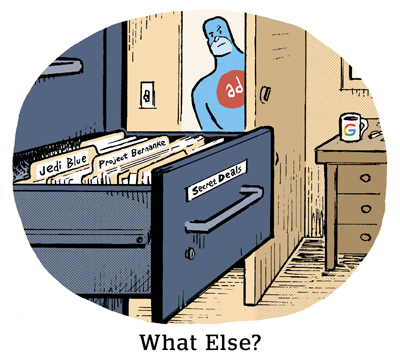
What a world.
On Friday of last week, over the course of less than 24 hours, the UK’s competition authority provisionally closed its investigation into the Chrome Privacy Sandbox, and, separately, a coalition of top European publishers filed an antitrust complaint in the EU accusing Google of anticompetitive digital advertising practices.
Never a dull moment. Here’s a rundown of what happened.
Sandbox patrol
After investigating Google’s plan to phase out third-party cookies in Chrome for more than a year and months of back-and-forth discussions, the UK’s Competition and Markets Authority (CMA) accepted Google’s revised commitments to address anticompetition concerns related to the Privacy Sandbox.
These commitments are now legally binding and include updates based on feedback collected late last year from ad tech providers, advertisers, publishers, trade orgs and academics. The ad industry, in particular, was concerned that Google’s original set of commitments to the CMA didn’t include a strong enough enforcement mechanism or provide enough transparency and clarity into Google’s own use of data.
Now, Google has agreed not to remove third-party cookies until the CMA “is satisfied that its competition concerns have been addressed.” The CMA’s main worry is that phasing out third-party cookies in Chrome will give Google an unfair advantage in the digital ad market (not that it doesn’t arguably … allegedly? … have one already).
Google also pledged to involve the CMA and the Information Commissioner’s Office (the UK’s data protection authority) to develop and test Privacy Sandbox proposals. Google also pledged to more openly engage with third parties and publish test results.
As you may recall, there was a big brouhaha early last year when Google claimed cohort-based advertising using the now-retired Federated Learning of Cohorts API is 95% as effective as cookie-based targeting. But Google didn’t share details about its measurement methodology and how other companies could achieve similar results.
(Eventually, it came out that Google’s FLoC experiment relied on frequency capping tied to cookies and real-time access to cross-site publisher data, neither of which will be available once cookies go kaputski.)
Google also promised to restrict the sharing of data within its own sites and apps and not self-preference its own ad tech after removing third-party cookies.
A CMA-approved trustee (to be appointed “shortly”) will be tasked with monitoring Google to make sure it sticks with the program.
If Google doesn’t adhere to its commitments to the CMA’s satisfaction, the regulator reserves the right to “take further action,” including reopening its investigation.
More information than you ever knew you wanted or needed about Google’s final commitments is available here.
“The commitments we have obtained from Google will promote competition, help to protect the ability of online publishers to raise money through advertising and safeguard users’ privacy,” Andrea Coscelli, the CMA’s chief executive, said in a statement.
Google’s “stranglehold”
But these decisions are central to how sites and publishers make money through online advertising … and some publishers are taking matters into their own hands.
Within an hour of (but separate from) the CMA’s announcement about Privacy Sandbox, the European Publishers Council (EPC) filed a formal antitrust complaint with the European Commission (EC) accusing Google of anticompetitive conduct in the digital ad market.
The European Commission has its own ongoing antitrust investigation looking into Google allegedly preferencing its own ad products. That probe kicked off in June 2021. The EPC said it expects for its complaint to form part of the EC’s investigation.
The EPC’s membership includes the CEOs and chairs of some of the biggest media brands in Europe and the world, among them News UK, Schibsted, The New York Times, The Guardian, Pearson, Conde Nast, Bonnier, Bauer Media and Axel Springer.
Christian Van Thillo, the EPC’s chairman, didn’t mince words in a statement released alongside the complaint calling on the European Commission “to take concrete steps right now that will actually break the stranglehold that Google has over us all.”
Many of the allegations in the EPC’s complaint echo the claims laid out in the Texas-led antitrust lawsuit, originally filed in December 2020, unredacted in October 2021, then unredacted yet again in January.
The EPC accuses Google of actively depressing publisher revenue by preventing ad exchanges from competing against each other to boost prices. The higher price averages that publishers have been able to achieve via header bidding, the complaint argues, only proves this point.
The complaint also calls Google out for its “supra-competitive” 20% fees on AdX, for removing the ability for publishers to set buyer-specific floors as part of the switch to a first-price auction in 2019 (which favored Google’s ad buying tools) and for generally manipulating the auction (Project Bernanke, etc.).
Oh, and can’t forget about cookies.
The EPC notes that Google’s plans to kill third-party cookies in Chrome “in the absence of an effective replacement” could further diminish publisher revenue in the short term by up to 70%.
Guess they don’t have a lot of faith in the Privacy Sandbox.






 By
By 
